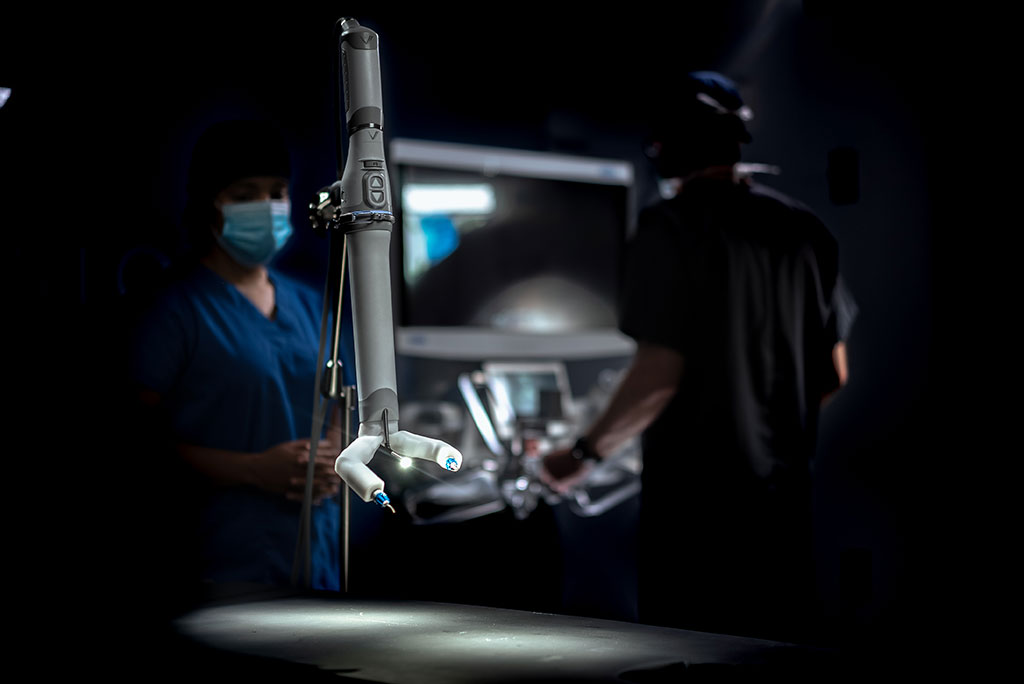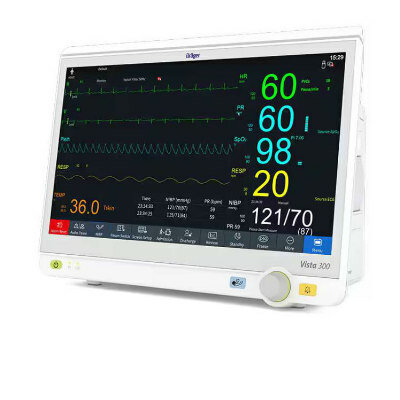World’s First Miniaturized Robotic-Assisted Surgery Platform to Make OR Robot-Ready
|
By HospiMedica International staff writers Posted on 20 Apr 2022 |

A miniaturized robotic-assisted surgery (RAS) platform with its small, sleek design offers the benefits of RAS during abdominal procedures without the logistical inefficiencies of traditional mainframe robotics. The easily accessible device weighs only two pounds and can be used in any operating room (OR).
The MIRA Platform from Virtual Incision Corporation (Lincoln, NE, USA) is the world’s first miniaturized RAS platform and does not require a dedicated mainframe room. With its drape- and dock- free design and portability, MIRA is quick to set up, clean up, and move in between cases, enabling an increased robotic-assisted surgery caseload. With MIRA, every OR is robot-ready.
MIRA’s unique design allows surgeons to obtain full multi-quadrant access without the need of docking and re-docking a large, cumbersome external platform. It is simply inserted through a single port and held in place with an adjustable stand that attaches to the OR table. Due to MIRA’s small footprint, staff and surgeons may be closer to the patient than ever before. The space-saving surgical system is designed to help more ORs perform more RAS cases by leveraging their existing infrastructure.
MIRA’s design, along with the camera, can be easily cleaned and sterilized between cases without the need for special equipment. This eliminates the expense and time associated with draping that is necessary for other RAS platforms available today. A compatible suite of single-use disposable instruments is available to ensure surgeons have the tools they need. The surgeon console allows the surgeon to have complete control of MIRA’s instrument arms and endoscopic vision of the anatomy in real-time. With the goal of reducing training time, MIRA’s hand controls and foot pedals are designed to be familiar to minimally invasive surgeons. The console is built to improve surgeon ergonomics, allowing them to sit upright without having to put their head in an isolating chamber or wear inflexible headwear that other systems require. This gives surgeons the opportunity to perform RAS with improved situational awareness of the OR.
The U.S. Food and Drug Administration (FDA) has approved an Investigational Device Exemption (IDE) supplement to complete the final stage of the company’s clinical study analyzing the MIRA Platform in bowel resection procedures. The approval was supported by a favorable interim clinical study report on the safety profile of MIRA. The IDE supplement approval puts Virtual Incision on track to obtain the clinical evidence needed to bring innovation to the soft tissue surgical robotics industry. Results of the completed study will support MIRA’s upcoming FDA De Novo application for market authorization.
“Our clinical experience has been extremely positive so far,” said Dr. Michael Jobst at Bryan Medical Center, the first surgeon in the world to operate with the device. “I was able to perform 100% of the dissection with MIRA in all of my cases. We have also been pleased with its accessibility and efficiency. I operated on eight patients in five different operating rooms, and that’s something that’s just not possible with mainframe RAS platforms. MIRA has the potential to bring the benefits of minimally invasive surgery to more patients, and that’s truly exciting.”
“MIRA was created to address the limitations of traditional robotic-assisted mainframe machines. We miniaturized and simplified MIRA to make it more accessible, easy to use, and easy to adopt,” said John Murphy, president and chief executive officer of Virtual Incision. “These are the features that will allow surgeons to treat more patients each day. It is encouraging to see MIRA demonstrating the potential to help surgeons perform simplified robotic procedures safely and precisely. Completing the final stage of our clinical study will be a key milestone along MIRA’s regulatory pathway, and we will continue to focus on clinical excellence to best support the innovation we provide to patients and surgeons.”
Related Links:
Virtual Incision Corporation
Latest Surgical Techniques News
- Pioneering Sutureless Coronary Bypass Technology to Eliminate Open-Chest Procedures
- Intravascular Imaging for Guiding Stent Implantation Ensures Safer Stenting Procedures
- World's First AI Surgical Guidance Platform Allows Surgeons to Measure Success in Real-Time
- AI-Generated Synthetic Scarred Hearts Aid Atrial Fibrillation Treatment
- New Class of Bioadhesives to Connect Human Tissues to Long-Term Medical Implants
- New Transcatheter Valve Found Safe and Effective for Treating Aortic Regurgitation
- Minimally Invasive Valve Repair Reduces Hospitalizations in Severe Tricuspid Regurgitation Patients
- Tiny Robotic Tools Powered by Magnetic Fields to Enable Minimally Invasive Brain Surgery
- Magnetic Tweezers Make Robotic Surgery Safer and More Precise
- AI-Powered Surgical Planning Tool Improves Pre-Op Planning
- Novel Sensing System Restores Missing Sense of Touch in Minimally Invasive Surgery
- Headset-Based AR Navigation System Improves EVD Placement
- Higher Electrode Density Improves Epilepsy Surgery by Pinpointing Where Seizures Begin
- Open-Source Tool Optimizes Placement of Visual Brain Implants
- Easy-To-Apply Gel Could Prevent Formation of Post-Surgical Abdominal Adhesions
- Groundbreaking Leadless Pacemaker to Prevent Invasive Surgeries for Children
Channels
Critical Care
view channel
Ingestible Smart Capsule for Chemical Sensing in the Gut Moves Closer to Market
Intestinal gases are associated with several health conditions, including colon cancer, irritable bowel syndrome, and inflammatory bowel disease, and they have the potential to serve as crucial biomarkers... Read moreNovel Cannula Delivery System Enables Targeted Delivery of Imaging Agents and Drugs
Multiphoton microscopy has become an invaluable tool in neuroscience, allowing researchers to observe brain activity in real time with high-resolution imaging. A crucial aspect of many multiphoton microscopy... Read more
Novel Intrabronchial Method Delivers Cell Therapies in Critically Ill Patients on External Lung Support
Until now, administering cell therapies to patients on extracorporeal membrane oxygenation (ECMO)—a life-support system typically used for severe lung failure—has been nearly impossible.... Read morePatient Care
view channel
Portable Biosensor Platform to Reduce Hospital-Acquired Infections
Approximately 4 million patients in the European Union acquire healthcare-associated infections (HAIs) or nosocomial infections each year, with around 37,000 deaths directly resulting from these infections,... Read moreFirst-Of-Its-Kind Portable Germicidal Light Technology Disinfects High-Touch Clinical Surfaces in Seconds
Reducing healthcare-acquired infections (HAIs) remains a pressing issue within global healthcare systems. In the United States alone, 1.7 million patients contract HAIs annually, leading to approximately... Read more
Surgical Capacity Optimization Solution Helps Hospitals Boost OR Utilization
An innovative solution has the capability to transform surgical capacity utilization by targeting the root cause of surgical block time inefficiencies. Fujitsu Limited’s (Tokyo, Japan) Surgical Capacity... Read more
Game-Changing Innovation in Surgical Instrument Sterilization Significantly Improves OR Throughput
A groundbreaking innovation enables hospitals to significantly improve instrument processing time and throughput in operating rooms (ORs) and sterile processing departments. Turbett Surgical, Inc.... Read moreHealth IT
view channel
Printable Molecule-Selective Nanoparticles Enable Mass Production of Wearable Biosensors
The future of medicine is likely to focus on the personalization of healthcare—understanding exactly what an individual requires and delivering the appropriate combination of nutrients, metabolites, and... Read more
Smartwatches Could Detect Congestive Heart Failure
Diagnosing congestive heart failure (CHF) typically requires expensive and time-consuming imaging techniques like echocardiography, also known as cardiac ultrasound. Previously, detecting CHF by analyzing... Read moreBusiness
view channel
Expanded Collaboration to Transform OR Technology Through AI and Automation
The expansion of an existing collaboration between three leading companies aims to develop artificial intelligence (AI)-driven solutions for smart operating rooms with sophisticated monitoring and automation.... Read more
















